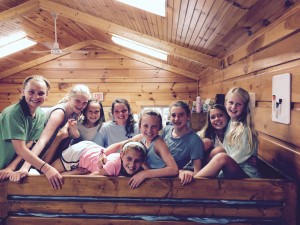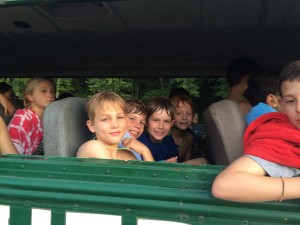CSP Team Note: We recently chatted with Paul Smolen, MD, FAAP, a pediatrician at Providence Pediatrics, part of Carolinas HealthCare System, about his tips for sending your child to overnight summer camp. A big thank you to him for his insight – there’s some GREAT advice here for parents with kids of all ages.
At what age should you consider sending your child to sleep away camp?
Like so many things in life, it depends. When your child confidently sleeps at other children’s homes, shows an interest in sleep away camp, successfully masters day camp, and is at an age where the benefits of a new camp experience outweigh some homesickness, it might be time to seriously consider sleep away camp. 
What are the benefits to your child of attending summer sleep away camp?
I am a big advocate of camp, especially the sleep away variety. In my mind, the most important aspect of the experience is the water safety skills that most camps provide. In a camp setting, your child will have no choice but to improve their water safety skills. Additionally, a child has an opportunity to try crafting, archery, riflery, and other camping activities. Learning to meet and live with new people who may come from different backgrounds is also a plus. Finally, learning to take care of oneself and become a little more self-sufficient in a new environment also provides great value. Sleep away camp can be an important tool to build a child’s confidence and encourage their independence.
What are some things to consider when choosing your child’s sleep away camp?
I go with the three Rs: reputation, reviews and recommendations. When deciding on the best camp for their child, I think parents should also keep in mind specialty activities that a particular camp may provide, such as horseback riding or nature programs.
Tell us some tips for sending your child away for the first time.
Have a buddy if possible, someone your child knows and gets along with. This can make the experience of leaving home much easier for them. And parents need to remember that an important aspect of going to sleep away camp is to have their child immersed in a new environment. Parents can enhance that experience by limiting communication with their child. To that end, I don’t think it is beneficial to send a child to sleep away camp with a cell phone or other instant-communication device. They are at camp to experience new things, not to constantly communicate with family. If there is a problem, the camp will let you know.
I also believe that first-time campers shouldn’t stay for more than a week. Future summers can be longer if they wish, but getting used to being away takes some getting used to.
What are some ways to get your child oriented to the idea of sleep away camp before actually going?
Three things come to mind:
1. Take them camping with your family and allow them to sleep away from home in this way.
2. Let them sleep at a friend’s home on a regular basis.
3. And finally, if the camp is close enough, go visit the facility before camp begins. Being familiar with the camp can be of great value for the child.
How can you calm an anxious child’s nerves before camp?
Being nervous is normal. I would be surprised if they weren’t nervous, being away from family in an unfamiliar place can be frightening. The antidote for nervousness, however, is empathy and predictability. Show them empathy by sharing stories of when you (their parent) were very nervous about a new experience and how you handled that experience. Show your child pictures of camp and share what the daily activities might entail, this will enhance predictability once they arrive at camp.
What are some red flags to look for if your child might not be a good candidate for sleep away camp?
If your child still is showing a lot of separation anxiety when they leave home, they cry easily, are prone to tantrums, have trouble making social connections at school, are bedwetters, or don’t seem emotionally mature enough to handle the stress of leaving home, I think they are probably not ready for sleep away camp.
If a child has specific special needs, how should a parent address them?
Special health or dietary needs should be arranged with the camp staff prior to their arrival. Explicit instructions need to be made for children with special health problems. Detailed action plans need to be provided for children with food allergy, asthma, or diabetes, as well as providing the camp with necessary medical supplies. Remember, you are relying on the camp staff to take your place. They need to be ready. Fortunately, most camps are good at this.
![]()
Dr. Paul Smolen, also known as Doc Smo by his friends, is a pediatrician at Providence Pediatrics. He has more than 34 years of experience caring for children and families. He is a graduate of Duke University (1974), Rutgers Medical School (1978), and Wake Forest University-N.C. Baptist Hospital (1982). At Wake Forest University he completed a residency in general pediatrics, served as chief resident, and completed a fellowship in ambulatory pediatrics. Subsequently, he became board certified in the American Academy of Pediatrics (1983). For the last 34 years, he has been an adjunct associate professor of pediatrics at the University of North Carolina-Chapel Hill, helping to train a generation of medical students and pediatric residents as well as author several research papers. He is also the author of a parenting book called, Can Doesn’t Mean Should and a parenting blog, DocSmo.com.
![]()
Levine Children’s Hospital
Facebook
Instagram
Twitter
Pinterest




